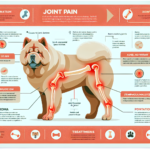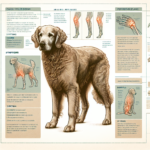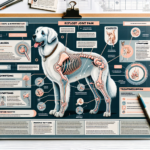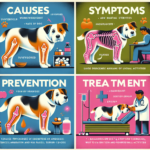Chow Chow Joint Pain: Causes, Symptoms, Prevention, and Treatment

Introduction
The Chow Chow is a distinctive and ancient breed known for its lion-like mane, blue-black tongue, and dignified demeanor. Originating from China, the Chow Chow has a rich history dating back over 2,000 years. Initially bred for various purposes, including hunting, herding, and guarding, this breed has evolved into a beloved companion known for its loyalty and independence.
While the Chow Chow is generally a robust breed, it is not without its health concerns. Common issues include eye problems, skin conditions, and, notably, joint pain. Joint health is particularly crucial for Chow Chows due to their unique build and predisposition to certain joint-related ailments.
Breed-Specific Joint Pain Risks
Genetic Predisposition
Chow Chows are genetically predisposed to several joint-related issues, including hip dysplasia, elbow dysplasia, and arthritis. Hip dysplasia, a condition where the hip joint does not fit into the hip socket properly, is particularly prevalent in this breed. This genetic predisposition makes it essential for Chow Chow owners to be vigilant about their dog’s joint health from an early age.
Age-Related Risks
As Chow Chows age, the risk of developing joint pain increases. Typically, signs of joint issues may start to appear as early as five to six years old. However, some dogs may show symptoms earlier or later, depending on their genetic makeup and lifestyle. It’s crucial to monitor your Chow Chow for any signs of discomfort or mobility issues as they age.
Activity Level and Joint Stress
Chow Chows are not as high-energy as some other breeds, but they still require regular exercise to maintain their health. However, excessive or inappropriate exercise can lead to joint stress and exacerbate existing conditions. Activities that involve a lot of jumping or sudden stops and starts can be particularly harmful to their joints.
Common Symptoms of Joint Pain in Chow Chows
General Symptoms
- Limping or favoring one leg
- Stiffness, especially after resting
- Reluctance to climb stairs or jump
- Decreased activity or playfulness
- Visible discomfort or pain when touched
Breed-Specific Symptoms
In Chow Chows, joint pain may manifest more subtly due to their stoic nature. Owners might notice a decrease in the dog’s willingness to engage in activities they once enjoyed. Additionally, the breed’s thick fur can sometimes mask physical signs of swelling or discomfort, making it even more important to pay attention to behavioral changes.
When to Consult a Vet
If you observe any of the above symptoms in your Chow Chow, it’s essential to consult a veterinarian promptly. Early diagnosis and intervention can significantly improve the quality of life for dogs suffering from joint pain. Regular veterinary check-ups are also crucial for early detection and management of joint issues.
Preventive Measures for Joint Health
Exercise Recommendations
Moderate, low-impact exercises are ideal for maintaining joint health in Chow Chows. Activities such as walking, swimming, and gentle play can help keep their joints flexible without causing undue stress. Avoid high-impact activities like jumping or running on hard surfaces, which can exacerbate joint issues.
Dietary Suggestions
A balanced diet rich in essential nutrients is vital for joint health. Consider incorporating foods or supplements that contain glucosamine, chondroitin, and omega-3 fatty acids, which are known to support joint function. Always consult your veterinarian before adding any supplements to your dog’s diet.
Weight Management
Maintaining a healthy weight is crucial for reducing joint stress. Excess weight can exacerbate joint pain and lead to other health issues. Monitor your Chow Chow’s weight closely and adjust their diet and exercise routine as needed to keep them at an optimal weight.
Early Screening and Monitoring
Regular veterinary check-ups and early screening for joint issues can help catch problems before they become severe. For Chow Chows, specific tests like hip and elbow evaluations can be beneficial. Early intervention can make a significant difference in managing joint health effectively.
Treatment Options for Joint Pain
Non-Surgical Treatments
Non-surgical treatments for joint pain in Chow Chows include medications, physical therapy, and lifestyle adjustments. Anti-inflammatory drugs and pain relievers can help manage symptoms, while physical therapy can improve mobility and strengthen muscles around the joints. Lifestyle changes, such as providing a comfortable resting area and avoiding high-impact activities, can also be beneficial.
Surgical Options
In severe cases, surgical intervention may be necessary. Common surgeries for joint issues in Chow Chows include hip replacement, arthroscopy, and joint fusion. These procedures can provide significant relief and improve the dog’s quality of life. However, surgery should be considered a last resort after exploring all other treatment options.
Alternative Therapies
Alternative treatments like acupuncture, hydrotherapy, and massage can also be effective in managing joint pain. Acupuncture can help reduce pain and inflammation, while hydrotherapy provides low-impact exercise that can improve joint function. Massage therapy can help relieve muscle tension and improve circulation.
Lifestyle and Management Tips
Daily Care Routine
A consistent daily care routine can help manage joint pain in Chow Chows. This routine might include gentle exercise, a balanced diet, and regular grooming to monitor for any physical changes. Providing a comfortable resting area with orthopedic bedding can also make a significant difference.
Modifying the Home Environment
Making small changes to your home environment can help alleviate joint pain for your Chow Chow. Consider installing ramps to help them navigate stairs or get onto furniture. Orthopedic beds can provide additional support, and non-slip mats can prevent falls on slippery surfaces.
Long-Term Management
Long-term management of joint pain involves regular veterinary check-ups, ongoing monitoring of symptoms, and adjustments to the dog’s lifestyle as needed. Keeping your Chow Chow active and engaged, while avoiding activities that stress the joints, can help them live a happy and comfortable life.
FAQs About Chow Chows and Joint Pain
What are the early signs of joint pain in Chow Chows?
Early signs of joint pain in Chow Chows include limping, stiffness, reluctance to move, and decreased activity levels. If you notice any of these symptoms, consult your veterinarian for a thorough evaluation.
Can diet help prevent joint pain in Chow Chows?
Yes, a balanced diet rich in essential nutrients like glucosamine, chondroitin, and omega-3 fatty acids can support joint health and potentially prevent joint pain. Always consult your veterinarian before making any dietary changes.
Are there specific exercises that are better for Chow Chows with joint pain?
Low-impact exercises such as walking and swimming are ideal for Chow Chows with joint pain. These activities help maintain joint flexibility without causing additional stress.
When should I consider surgery for my Chow Chow’s joint pain?
Surgery should be considered a last resort after exploring all other treatment options. If your Chow Chow’s joint pain is severe and significantly impacts their quality of life, consult your veterinarian to discuss surgical options.
Conclusion
Joint pain is a common issue in Chow Chows, but with proper care and attention, it can be managed effectively. By understanding the breed-specific risks, recognizing early symptoms, and taking preventive measures, you can help ensure your Chow Chow enjoys a healthy and active life. Regular veterinary check-ups and a proactive approach to joint health are essential for keeping your beloved pet comfortable and happy.
Remember, early intervention is key. If you notice any signs of joint pain in your Chow Chow, consult your veterinarian promptly. With the right care and management, you can help your Chow Chow live a long, healthy, and pain-free life.




